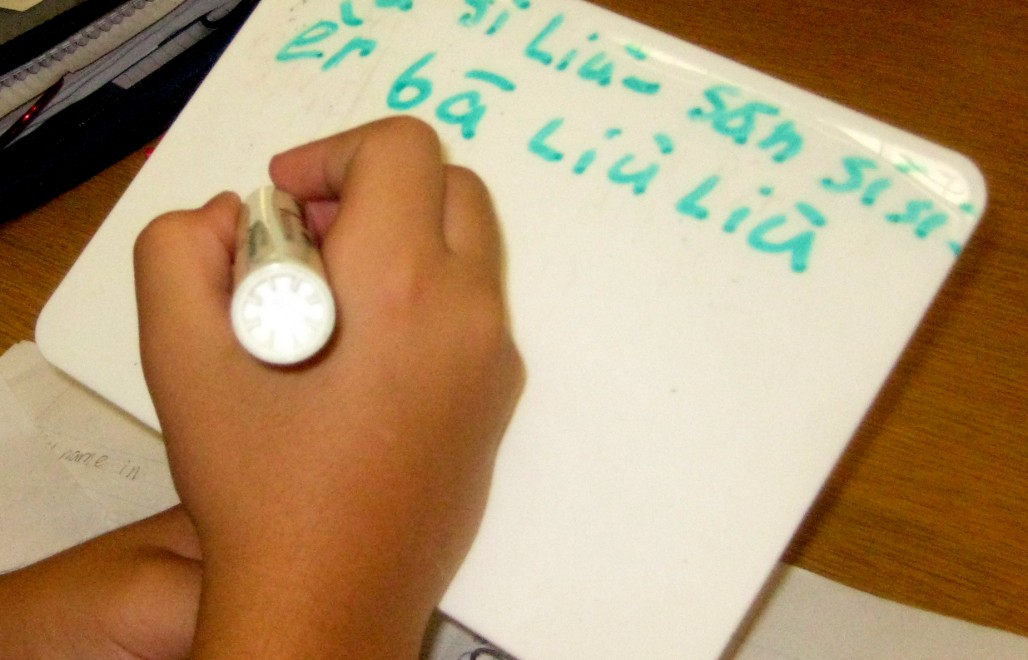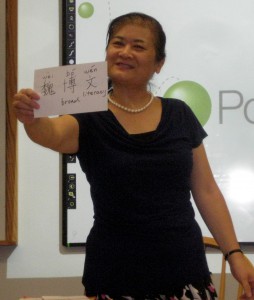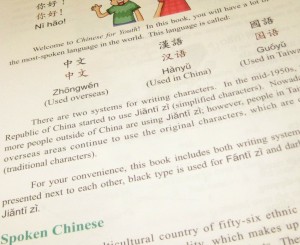The Year of the Goat: Mandarin Courses Charge Ahead at BFS

Two years ago Middle School parents Kathryn Scott and Wenda Gu made a philanthropic gift to BFS, and asked that it be earmarked for the school’s nascent Mandarin language program. The request might seem unusual given that the couple were new to the school and that their daughter, now a 7th grader, isn’t yet old enough to take the courses, but there is a good reason for their passion.
Wenda Gu is an internationally acclaimed avant garde painter and sculptor. He was born and raised in Shanghai. He holds a masters degree from the China Academy of Art and later returned to teach there, but not until he came to the US with just $25 and his unique artistic vision. Today he is a superstar of the art world. Kathryn, a well-known interior designer, met her husband at an Asia Society event over 15 years ago called, prophetically for Kathryn, Asia on My Mind. “He was the guest speaker and I was attending as something different to do,” she said. “Before that, I didn’t have a specific interest in China except for feeling compatible to Taoism and admiring the landscape paintings of Guiling from my college art history class days. I certainly never imagined that one day I would have relatives in China.”
The pair married and today keep an office in Shanghai where their daughter spent much of her childhood. The trio also knew BFS’ Head of School Larry Weiss from their daughter’s previous school which Larry headed before coming here. Larry holds a certificate in East Asia Relations from Columbia University’s School of International Affairs, and he spearheaded BFS’ first Mandarin language courses four years ago. It started as an After 3@Willoughby noncredit college level elective for Upper School students. From there it quickly evolved in scope and popularity.
Today the courses are taught by Judy Deng and begin as an elective in eighth grade. In the Upper School the courses have now become part of the IB curriculum. The juniors and seniors who took IB Mandarin as their language elective last year were the first BFS students to sit for the IB Mandarin exam. In a recent eighth grade Mandarin course in the Middle School, students started out by reacquainting themselves with the basics they’d learned in their first few classes. Huanying means welcome. Ne how means hello. Ne man hao means hello, everyone. Beijing means north capital. Shanghai means upon the sea. And, by the way, 2015 is the year of the goat, an auspicious astrological sign in China foretelling a year of prosperity.
“In Chinese, one word, one meaning,” was Judy’s refrain throughout the class. She later illustrated the point of the handy catchphrase. “Huo means fire, shan means mountain, and put together they mean volcano. That is an example of one syllable-one character-one meaning. They are like pieces of blocks. If you know the meanings of individual words, you can learn new phrases very fast.” This isn’t entirely true as there are some Mandarin words that carry several meanings. As with all languages there are exceptions to the rules, but the catchphrase is a memorable starting place for beginners.
Today’s topic was numerals. An easy place to start was for students to translate their own phone numbers into Mandarin one numeral at a time. The English phonetic spelling on the page is one thing. Pronunciations are something else. Students took turns reading their phone numbers aloud in Mandarin while the rest of the class tried to translate the last four digits aloud back into English. Given that this is only the fourth time the class has met, it was a mouthful and the students seemed to fare well.
Pronunciations, especially with the correct tone, are crucial in Mandarin. You might have heard the old joke that in Chinese ma means mother but if pronounced wrong it means horse. Well, it’s true. A bit of aerobics helped the students memorize the tones. Judy had them stand by their desks and swing their arms like orchestra conductors while pronouncing a sound in each of the four tones; up, down, quickly down and up, and sharply down, the latter being the angriest and usually applying to unpleasant words. “It helps if you stomp your foot on that one,” Judy quipped. After a few minutes of arm swinging, foot stomping and giggles, it was time for the students to take their seats and crack open their workbooks.
Ninth grader Galen J. took this eighth grade class last year and is continuing with the next level this year in the Upper School. “It’s a very different language and I was interested in it,” she said. “Judy’s a great teacher and she’s great at explaining the characters.” Galen’s interest in Chinese language and culture lies partly in a visit she took to China several years ago. Now that she’s studying the language, “I definitely think that I would like to go again.”
Kathryn further explained her and Wenda’s goal with their donation. “We felt that because of Larry’s personal interest in China, BFS would eventually have a stronger connection to Chinese studies, and it would inspire related programs,” said Kathryn. “We wanted our daughter to have a knowledge of Chinese culture and language since that is her cultural heritage.”
If looking out for their own daughter had been their only goal it would have been simple enough to send her for private lessons, but Kathryn shares her husband’s proven passion for bringing awareness of Chinese art, culture and history to the world. “We believe other children should have the opportunity to learn the language as well. A direct interaction between people of different cultures bonds us together as we recognize our similarities and respect our differences. We are all connected.”
These words of tolerance and cross-cultural celebration might seem inspired by Quaker ideals but Kathryn admits they knew nothing about Quakerism before discovering BFS. The philosophical match was a happy coincidence. “We were attracted to BFS because of their combination of a standard academic structure with a focus community. We didn’t know much about the Quaker philosophy until then but now it seems hard to imagine a good school without the Quaker base.”
Even so, Kathryn and Wenda lament that intensive language study at the school doesn’t begin formally until Middle School (Spanish starts in kindergarten, and the afterschool program for preschool-grade 4 offers Mandarin, French and Spanish.) They hope their gift inspires remedies in this direction. “It’s too bad that American schools don’t typically begin at an earlier age,” said Kathryn, “since children absorb language so easily. Many years of opportunity are lost by waiting until eighth grade. But these thoughts create goals, and who knows what will be achieved over time.”


